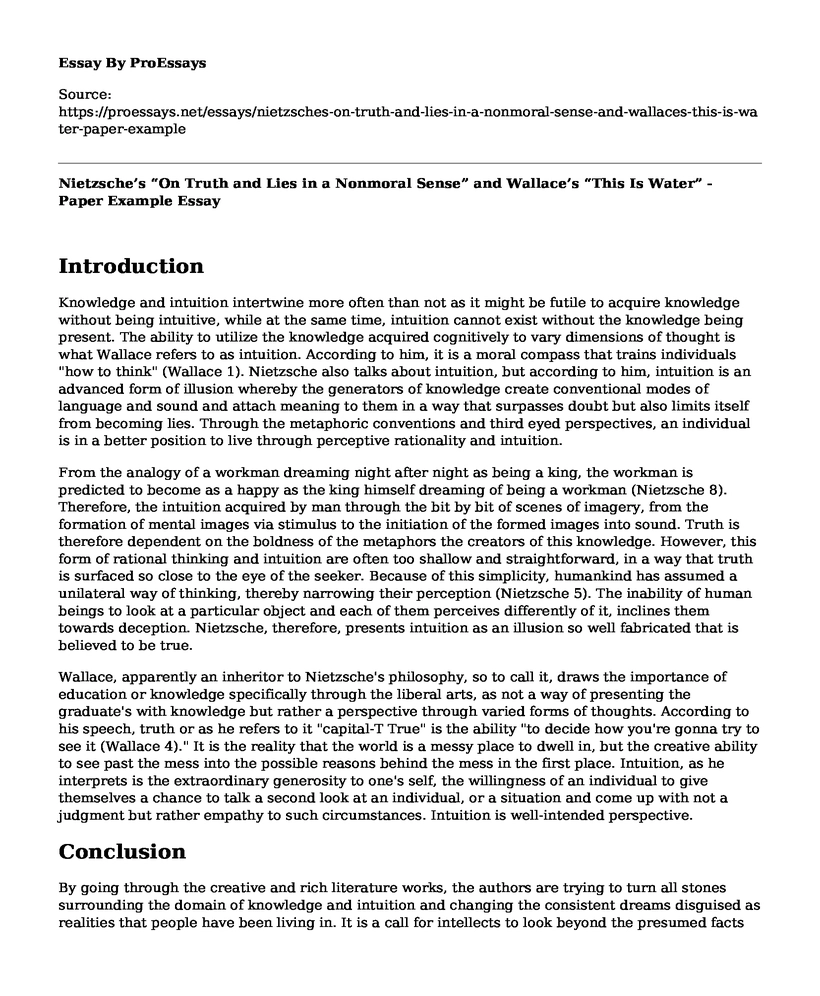Introduction
Knowledge and intuition intertwine more often than not as it might be futile to acquire knowledge without being intuitive, while at the same time, intuition cannot exist without the knowledge being present. The ability to utilize the knowledge acquired cognitively to vary dimensions of thought is what Wallace refers to as intuition. According to him, it is a moral compass that trains individuals "how to think" (Wallace 1). Nietzsche also talks about intuition, but according to him, intuition is an advanced form of illusion whereby the generators of knowledge create conventional modes of language and sound and attach meaning to them in a way that surpasses doubt but also limits itself from becoming lies. Through the metaphoric conventions and third eyed perspectives, an individual is in a better position to live through perceptive rationality and intuition.
From the analogy of a workman dreaming night after night as being a king, the workman is predicted to become as a happy as the king himself dreaming of being a workman (Nietzsche 8). Therefore, the intuition acquired by man through the bit by bit of scenes of imagery, from the formation of mental images via stimulus to the initiation of the formed images into sound. Truth is therefore dependent on the boldness of the metaphors the creators of this knowledge. However, this form of rational thinking and intuition are often too shallow and straightforward, in a way that truth is surfaced so close to the eye of the seeker. Because of this simplicity, humankind has assumed a unilateral way of thinking, thereby narrowing their perception (Nietzsche 5). The inability of human beings to look at a particular object and each of them perceives differently of it, inclines them towards deception. Nietzsche, therefore, presents intuition as an illusion so well fabricated that is believed to be true.
Wallace, apparently an inheritor to Nietzsche's philosophy, so to call it, draws the importance of education or knowledge specifically through the liberal arts, as not a way of presenting the graduate's with knowledge but rather a perspective through varied forms of thoughts. According to his speech, truth or as he refers to it "capital-T True" is the ability "to decide how you're gonna try to see it (Wallace 4)." It is the reality that the world is a messy place to dwell in, but the creative ability to see past the mess into the possible reasons behind the mess in the first place. Intuition, as he interprets is the extraordinary generosity to one's self, the willingness of an individual to give themselves a chance to talk a second look at an individual, or a situation and come up with not a judgment but rather empathy to such circumstances. Intuition is well-intended perspective.
Conclusion
By going through the creative and rich literature works, the authors are trying to turn all stones surrounding the domain of knowledge and intuition and changing the consistent dreams disguised as realities that people have been living in. It is a call for intellects to look beyond the presumed facts and figures presented to them and be able to see the color blue when others are seeing red. It is a presentation of the harsh reality that life is, and preparation to face it, armed with positivism, sound judgment, and creative perception.
Works Cited
David Foster Wallace. This is water. Kenyon commencement speech. 2005. Pp. 1-6
Friedrich Nietzsche. On truth and lies in a nonmoral sense. Pp. 1-9
Cite this page
Nietzsche's "On Truth and Lies in a Nonmoral Sense" and Wallace's "This Is Water" - Paper Example. (2022, Jun 30). Retrieved from https://proessays.net/essays/nietzsches-on-truth-and-lies-in-a-nonmoral-sense-and-wallaces-this-is-water-paper-example
If you are the original author of this essay and no longer wish to have it published on the ProEssays website, please click below to request its removal:
- Mill, Kant and The Ethical Divid - Utilitarianism and Deontology
- The Role of the Narrator in Harper Lee's To Kill a Mockingbird: Literary Analysis Essay
- Literary Analysis Essay on What We Lose by Zinzi Clemmons
- The Relevance of the Tempest in the Modern World Essay Example
- Essay Example on a Melancholy Object: Begging Mothers and Children on the Streets
- Teaching Poetry: Strategies for Poetic Interpretation - Essay Sample
- Essay Example on A House in the Bamboo: Wang Wei's Chinese Tang Poem







